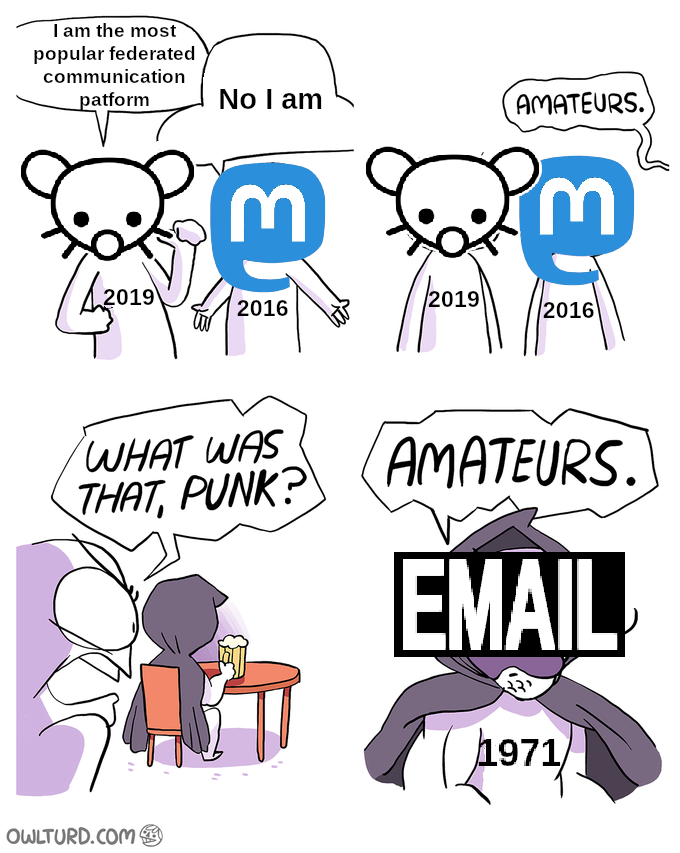this post was submitted on 26 Oct 2024
1074 points (97.1% liked)
Fediverse
28818 readers
1143 users here now
A community to talk about the Fediverse and all it's related services using ActivityPub (Mastodon, Lemmy, KBin, etc).
If you wanted to get help with moderating your own community then head over to [email protected]!
Rules
- Posts must be on topic.
- Be respectful of others.
- Cite the sources used for graphs and other statistics.
- Follow the general Lemmy.world rules.
Learn more at these websites: Join The Fediverse Wiki, Fediverse.info, Wikipedia Page, The Federation Info (Stats), FediDB (Stats), Sub Rehab (Reddit Migration), Search Lemmy
founded 2 years ago
MODERATORS
you are viewing a single comment's thread
view the rest of the comments
view the rest of the comments

Yeah and then google+microsoft rolled in and killed the decentralized nature of email with gmail and outlook.
Only sign left of the good ol days is merged accounts with @ old domain names and the few that self host.
It's not really like they were evil about it though. Google attracted customers through its huge (at the time) 1 GB email storage space, which at the time, was unbelievably generous and also impressive in that it was offered for free. Outlook (Hotmail at the time) also drew in customers by offering the service for free, anywhere in the world, without needing to sign up for Internet service. Remember, at the time, e-mail was a service that was bundled with your Internet service provider.
Into the mid-2000s and 2010s, the way that Gmail and Outlook kept customers was through bundle deals for enterprise customers and improvements to their webmail offerings. Gmail had (and arguably, still has) one of the best webmail clients available anywhere. Outlook was not far behind, and it was also usually bundled with enterprise Microsoft Office subscriptions, so most companies just decided, "eh, why not". The price (free) and simplicity is difficult to beat. It was at that point that Microsoft Outlook (the mail client, not the e-mail service) was the "gold standard" for desktop mail clients, at least according to middle-aged office workers who barely knew anything about e-mail to begin with. Today, the G-Suite, as it is called, is one of the most popular enterprise software suites, perhaps second only to Microsoft Office. Most people learned how to use e-mail and the Internet in the 2000s and 2010s through school or work.
You have to compare the offerings of Google and Microsoft with their competitors. AOL mail was popular but the Internet service provided by the same company was not. When people quit AOL Internet service, many switched e-mail providers as well, thinking that if they did not maintain their AOL subscription, they would lose access to their mailbox as well.
Google and Microsoft didn't "kill" the decentralised e-mail of yesteryear. They beat it fair and square by offering a superior product. If you're trying to pick an e-mail service today, Gmail and Outlook are still by far the best options in terms of ease of use, free storage, and the quality of their webmail clients. I would even go so far as to say that the Gmail web client was so good that it single-handedly killed the desktop mail client for casual users. I think that today, there are really only three legitimate players left if you're a rational consumer who is self-interested in picking the best e-mail service for yourself: Proton Mail if you care a lot about privacy, and Gmail or Outlook if you don't.
Nice to see someone else was around when the lore was written :D
In NZ instead of AOL it was xtra and Paradise.